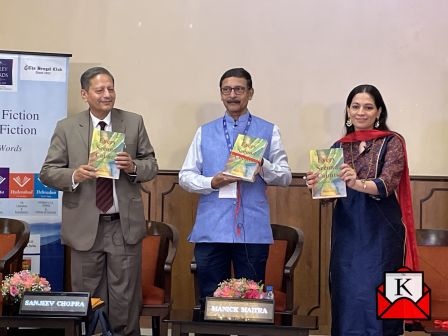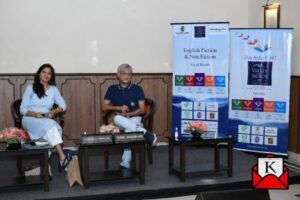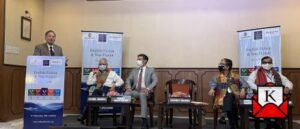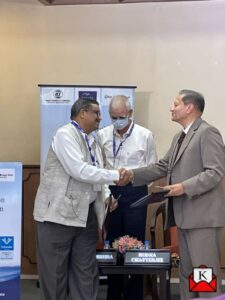VoW Kolkata Edition Organized With Two-Day Literary Meet


An international literature and arts festival, Valley of Words (VoW), based in Dehradun was inaugurated in Kolkata at The Bengal Club. After having successful chapters in Delhi and Hyderabad, the VoW Kolkata edition was a 2-day literary meet on 6th and 7th November.
The VoW is run by the Valley of Words Foundation Trust, a registered charitable Trust, established to support creative expressions across all genres through literature and arts festivals, debates, symposia, conversations, book launches, exhibitions, musicals, theatre, poetry cafés et al. Since 2017 the Trustees of VoW have organized four successful festivals in the picturesque setting of the Dehradun valley.
The fifth edition of the pan-India VoW, 2021, is being held across five Indian cities this year, in a new ‘phygital’ mode designed to overcome the obstacles created by COVID 19.
The Kolkata edition was curated around the shortlisted titles in the English Fiction and Non-fiction category of the annual VoW Book Awards, along with city-based authors from two other categories, Hindi Fiction and Translation. Being a hybrid event, the festival crossed geographical boundaries to directly connect short-listed authors based in the USA, UK, Sweden, and other Indian cities to city-based panelists and discussants.

The festival witnessed a few book launches, the first being Every Second Counts! by Master Trainer Manick Maitra, Special Commissioner of Revenue and Additional Director of NSATI, Government of West Bengal. This valuable guide on training was released by VoW board members Amna Mirza and Sanjeev Chopra.
The second launch was The Ambassador and the Private Eye, a detective novel by Krishnan Srinivasan who engaged in an interesting conversation on crime fiction with Chief Guest Monabi Mitra, herself a much-published author of police crime novels.
The third launch of the festival came on day 2 with Blaze: A Son’s Trial by Fire by Nidhi and Sushil Poddar, which was launched by the renowned cardiologist Dr. Kunal Sarkar. The last book launched at the festival was Jumbos on The Edge by Sanjeev K Chadha and was launched by V.K. Yadav of the Indian Forest Service.
The first session was From the Shadows of Time, a discussion on the book A Forgotten Ambassador in Cairo, around the life and career of Syud Hossain, between the author N. S. Vinodh and retired Ambassador and Foreign Secretary Krishnan Srinivasan. The session was ably moderated by Oindrilla Dutt.
Session 2, Claiming Space: On translating regional writing, featured an absorbing discussion with Ranjita Biswas around her translation from Assamese, The Loneliness of Hira Barua, and Anita Agnihotri, award-winning author in Bengali, on the issue of translating in today’s India. It was moderated by Debaroti Chakraborty of Presidency University.
In the third session Whose Country is It Anyway? the authors of A New Idea of India, Harsh Madhusudhan and Rajeev Mantri discussed the ideas in their book with journalist and author Samrat Choudhury. Moderated by history teacher Tina Servaia, this developed into a lively debate over conflicting ideas of the nation.

The afternoon saw the first of the ‘hybrid’ sessions, The Chosen, in which Analog/Virtual author and game designer Lavanya Lakshminarayan, joining live from Bangalore, discussed her futurist novel with author Avik Chanda. This discussion was moderated by Aatreyee Ghosh.
From the future to history: up next was Jinnah’s Journey, an intense session in which political scientist Dr. Ishtiaq Ahmed spoke on his book Jinnah: His successes, Failures, and Role in History, with in-depth responses from Prof Suranjan Das, VC, Jadavpur University, and Dr. Sukanya Mitra of Loreto College. Moderated by Sanjeev Chopra, this session engaged with the complexity of Jinnah’s political and ideological trajectory.
The last session of the first day was Daring to Disobey, around Gandhi in the Gallery: Art of Disobedience, whose author, academic Sumathi Ramaswamy joined in from the US. Her presentation of images from the book and the inputs of artist and pedagogue Sanchayan Ghosh of Kala Bhavan, Visva-Bharati, opened up new ways of thinking of the Mahatma. The session was moderated by Prateek Raja of Experimenter art gallery.
A long day of discussions ended with a feast of Hindustani classical music performance by ITC Sangeet Research Academy. An instrumental ensemble of Abir Hossain, Ayan Sengupta, Paramananda Roy, and Ashoke Mukherjee delighted the audience, followed by a rousing virtuoso vocal performance by Omkar Dadarkar, accompanied by Sarwar Hussain on sarangi, Gourab Chatterjee on harmonium, and BivashSanghai on tabla.
The second day of the festival witnessed a session on the new novel Kulbhushan ka Naam Darj Kijiye by the renowned author Alka Saraogi with Ramanjit Kaur. The next session Woman Front and Centre was on woman-centric debut novels of Sakoon Singh, author of In the Land of Lovers, and Mahek Jangda, author of Sometimes Ivory, Sometimes Sand with the writer Karuna Ezara Parikh.
The main highlight of day 2 of the festival was Poetry Café which saw the release of Karuna Parikh’s book of poems Where Stories Gather and many other discussions. Moderated by Sanjeev Chopra, the last but one session Those Sixteen Stormy Days was a discussion on the passing of the 1st Amendment of the Indian Constitution with the author Tripurdaman Singh and Jawhar Sircar, and Sunanda K. Datta-Ray. The session Beyond The Wall marked the last session where Gautam Bhatia discussed his speculative fiction title The Wall and its sequel with the writer Sandip Roy.
